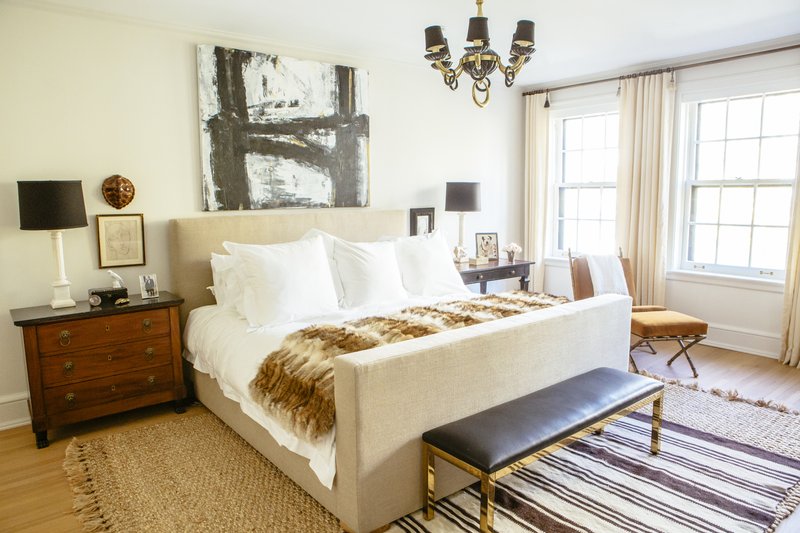A warm, cozy rug can make a room look and feel more appealing on even the chilliest fall night. And the right rug can be a source of comfort year-round.
"They're also great in the summer if you think about it. Because your shoes are off, you're in your shorts, the house is air-conditioned," says designer Michelle Gerson, founder of Michelle Gerson Interiors, based in New York. "You love to put your toes in a big cozy rug."
How do you choose the perfect rug for your space?
The latest options include everything from century-old Moroccan rugs to trendy, open-weave "sweater rugs."
Here, two interior designers — Gerson, Texas-based Ashley Moore, and Lauren Buxbaum Gordon, design director of Nate Berkus Associates — offer advice on choosing rugs and using them strategically to add color, texture and warmth to a room.
NEUTRAL, BOLD OR BOTH?
Gordon and Moore advise clients to consider rugs as beautiful, neutral backdrops for the rest of a room.
"Instead of being bold on pattern and color," she prefers to get creative with the look and texture of the material, Gordon says. She might choose a flat-weave jute rug in a neutral color, or "mohair, woven-knit rugs that look like sweaters," depending on the room and the client.
Really lush materials such as alpaca can make a dramatic statement without bold color or pattern.
Moore's approach is similar: "I tend to have it as a neutral palette because it tends to be one of the most expensive pieces in the house," she says. If a client is seeking some bold color or pattern, she brings that in through items such as pillows and accessories that can easily be changed if the homeowner wants something new.
"It's easier to change a pillow," Moore says, "than it is to change a 12-by-14 rug."
If you're craving a bit of color in the rug, flat-woven kilims that are mainly neutral but have some color can be a good compromise, especially if they are old and the hues have softly faded.
LAYERING
Layering rugs can give you both looks in one: a larger, neutral base with something striking, like a thin Moroccan rug with a colorful, intricate pattern, laid on top.
Moroccan rugs "look good anywhere," Gerson says. "You can put one in a fancy Parisian apartment and it makes it look cool. Or you can put it in your kid's dorm room and it makes it look cool."
Moore uses one as a runner on her kitchen floor to add a burst of color. She also says they can be great if you've bought a house with wall-to-wall carpeting that you don't love but aren't ready to actually pull up.
"My carpet in the bedroom is actually really dark, so I have a bright rug on it now," she says. Beyond adding color, the smaller rug helps "define the space," she says.
If you're layering, make sure the rugs are the right size, Gerson says. "Type into Pinterest 'layered rugs,'" she says, and search for pictures you love. Note the sizes of the rugs and their placement, so you can create the right balance in your own space.

SOFTNESS AND DURABILITY
Many people are particular about what their feet touch first thing in the morning, Gordon says. So a thick rug of mohair or soft, fluffy wool can be a great choice.
But in houses with young children or pets, an open-weave rug can soon look worn.
Many wool or mohair rugs also shed -— especially less expensive ones. That may be a worthwhile tradeoff: If you're buying a rug for a child's room and know you'll be redecorating in just a few years, Gordon says, you might be "fine with knowing that it may shed."
But while "no one wants to pay the price tag for a five-figure custom rug," she says, sometimes that is the wiser long-term investment.
Consider going antique: If a rug has already survived a long time and still looks good, Moore says, it will probably weather the wear you will give it too.
Natural fibers such as wool and silk are surprisingly easy to clean, these designers say. Just make sure you clean them the correct way. Fight the urge to wipe a stain (which can rub it in) and instead grab your vacuum cleaner hose to lift the stain up, Gerson says.
And protect rugs before stains happen: These designers suggest having rugs (and upholstery, too) professionally sealed. Many companies offer the service because, Gerson notes, "everybody spills."

HomeStyle on 08/24/2019

